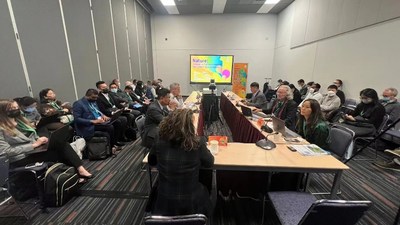|
09.12.2022 09:00:00
|
Tsinghua's institute for climate change and Asian Development Bank jointly call for good Nature-based Solutions practices in Asia
MONTREAL, Dec. 9, 2022 /PRNewswire/ -- The UN climate change conference COP27 in Egypt concluded less than three weeks before the kick-off of the 15th UN Biodiversity Conference (CBD COP15) in Montreal. The agendas of the UN treaties on climate change and biodiversity have increasingly intersected. This reflects a growing understanding of the linkages between the two issues and the need for integrated solutions.
The Institute of Climate Change and Sustainable Development at Tsinghua University (ICCSD) and Asia Development Bank (ADB) jointly announced to call for good practices on Nature-based Solutions across Asia at CBD COP15.
"The pathway to carbon neutrality is a systematic revolution related to society as a whole, so carbon neutrality is beyond climate change and Nature-based Solutions (NbS) should go beyond carbon sink only", said Dr. WANG Binbin, ICCSD's C+NbS head and Executive Secretary General of Global Alliance of Universities on Climate (GAUC) .
Defined at the United Nations Environment Assembly in this March, NbS refers to "Actions to protect, conserve, restore, sustainably use and manage natural or modified terrestrial, freshwater, coastal and marine ecosystems, which address social, economic and environmental challenges effectively and adaptively, while simultaneously providing human well-being, ecosystem services and resilience and biodiversity benefits."
Themed Nature "Innovative Pathway towards the Carbon Neutral Future", the side-event, co-organized by ICCSD and ADB, is to encourage more explorations on the potential of nature, in particular the sustainable use of nature resources from the climate change perspective.
"As an expert on climate, my reflection is that all renewable energy come from nature resources, so if we agree that renewable energy is the solution towards the net-zero future, then they are Nature-based Solutions from this point of view." Dr. WANG highlighted, "We should encourage synergic and integrated perspective."
To tap into nature's strength in addressing climate change, ICCSD has operated the C+NbS platform with more than 400 global partners and carried out a tracing study on global practices since 2019, right after the UN's Climate Action Summit in New York, where China and New Zealand were invited to lead the NbS coalition. The research built a database consisting of 300 global cases and then formulated an evaluation criterion considering the guidance of ecological civilization, UN's Sustainable Development Goals of the United Nations (SDGs), with reference to the IUCN Global Standard.
"We concluded 6 primary screening indicators and 3 deep evaluation dimensions to select out 28 good cases from the database as the recommended ones to be released during the first phase of the CBD COP15 in Kunming," Dr. WANG introduced. "As the following step, the research scope will be narrowed to the regional level, so as to more accurately find the most cutting-edge and exemplary practical cases."
ICCSD further join hands with ADB to establish an Asian NbS database for deeper analysis of such practices across the region. All organizations who have related practices in Asia could submit their cases to iccsd@tsinghua.edu.cn by March 31 2023. The report of the research is planned to be released at the 28th UN Climate Change Conference in Dubai.
The side-event signified the beginning of the strategic partnership between ICCSD and ADB. Representatives from The Nature Conservancy (TNC), World Economic Forum, and ClientEarth, together with GAUC's Global Youth Ambassador, exchange research and practical progress in the field during the plenary.
"We have confidence to explore more innovative solutions for the carbon neutral future with the strong support and network of ADB in Asia," said LI Zheng, President of ICCSD.
"Nature is now seen as the key in dealing with acute crises that the Asia and Pacific region is facing, namely, climate change, biodiversity loss, and food insecurity, " said ZHANG Qingfeng, ADB's Chair of the Environment Thematic Committee. According to ZHANG, ADB is also partnering with Stanford University for unlocking the potential of nature.
![]() View original content to download multimedia:https://www.prnewswire.com/news-releases/tsinghuas-institute-for-climate-change-and-asian-development-bank-jointly-call-for-good-nature-based-solutions-practices-in-asia-301699035.html
View original content to download multimedia:https://www.prnewswire.com/news-releases/tsinghuas-institute-for-climate-change-and-asian-development-bank-jointly-call-for-good-nature-based-solutions-practices-in-asia-301699035.html
SOURCE The Institute of Climate Change and Sustainable Development, Tsinghua
 Der finanzen.at Ratgeber für Aktien!
Der finanzen.at Ratgeber für Aktien!
Wenn Sie mehr über das Thema Aktien erfahren wollen, finden Sie in unserem Ratgeber viele interessante Artikel dazu!
Jetzt informieren!
